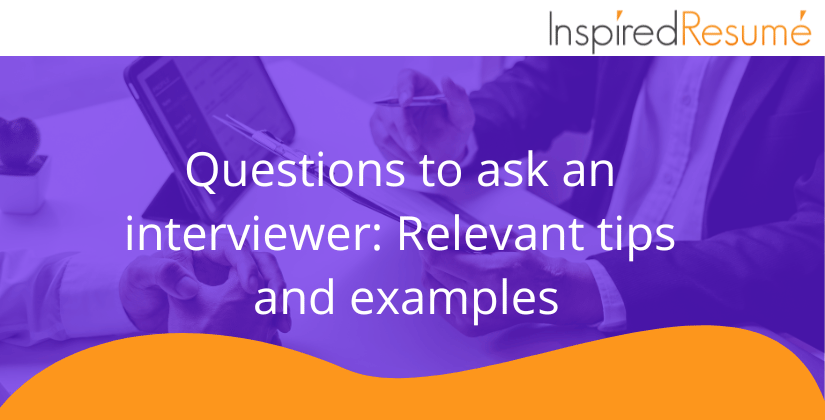When asking interviewers questions, it's important to remember that the interview is not only an opportunity for the employer to evaluate your fit for the position but also for you to assess whether the company and role align with your own goals and expectations. Ensure that your inquiries are thoughtful and relevant, reflecting your interest in the company and the role. Asking questions is not only about gathering information but also about building rapport with the interviewer.
How to ask questions during an interview
Apart from gathering information, asking insightful questions helps you demonstrate your enthusiasm, engagement, knowledge, and critical thinking skills. It's important to actively listen to the interviewer's responses and ask follow-up questions when appropriate. Here are some tips on how to ask questions to an interviewer:
Research the company: Before the interview, thoroughly research the company and its industry. This will help you come up with specific and relevant questions.
Ask about the company culture: Inquire about the company's values, work environment, and team dynamics. This shows that you are interested in fitting in well and contributing to the company's success.
Seek clarification on job responsibilities: Ask about the specific tasks and responsibilities of the role. This demonstrates your eagerness to understand the role and perform it effectively.
Inquire about growth opportunities: Show your ambition and desire for professional development by asking about potential career paths within the company, training programs, or mentorship opportunities.
Discuss the team and collaboration: Ask about the team structure and how collaboration is encouraged within the organization. This demonstrates your interest in working well with others and being a valuable team member.
Inquire about the company's future plans: Ask about the company's goals, expansion plans, or new initiatives. This shows your enthusiasm for the company's long-term vision and your interest in being a part of its growth.
Discuss the interview process and timeline: Seek clarification on the next steps in the hiring process, such as when you can expect to hear back from them. It denotes your professionalism and eagerness to move forward.
Also read: Best ways to answer why you want to work with us
Different types of questions for an interviewer
While some of the questions you ask the interviewer might be in response to the conversation going on, it’s also good to come prepared with a list of questions to ask your interviewer. Before your interview, practice presenting at least three questions that show that you gave the position some serious thought. The following are some different types of questions you can ask:
Company and culture
-How would you describe the company culture?
-What are the company's mission and long-term goals?
-Can you tell me about the team I am going to work with?
-What are the company's policies regarding professional development and growth?
Want expert feedback on your resume, absolutely free of cost? Get it here.
Role and responsibilities
-What are the main responsibilities and expectations of this role?
-In what way does this position contribute to the overall company goals?
-What would a typical day or week look like for someone in this role?
-Are there opportunities for cross-functional collaboration?
Team and management
-How does the team collaborate and communicate internally?
-What is the management style of the department or team?
-Can you provide some information about the team's structure?
Career development and advancement
-How does the company support employee career growth?
-Are there opportunities for training or further education?
-What would a career path for someone in this position look like?
Company performance and future outlook
-How has the company performed over the past few years?
-What are the company's strategies for growth and expansion?
-Are there any specific challenges the company is currently facing? Or exciting opportunities it’s exploring?
Work-life balance and benefits
-Can you tell me about the work-life balance at the company?
-What benefits and perks does the company offer to its employees?
-Is there flexibility in terms of working hours or remote work?
Company values and social responsibility
-What are the company's core values and how are they demonstrated in the workplace?
-Does the company participate in any CSR initiatives?
-What methods does the company use to prioritize diversity, equity, and inclusion?
Remember, these questions are just a starting point. Tailor them to the specific company and role you are interviewing for, and use them as a basis for further conversation during the interview. Additionally, actively listening during the interview might prompt additional questions based on the information provided by the interviewer.
Questions to avoid in interviews
There are some questions you should generally avoid as they may be inappropriate, illegal, or could negatively impact your chances of securing the job. Here are some examples:
· Personal or intrusive questions
· Salary and benefits
· Questions already answered
· Negative or critical questions
· Questions about time off
· Questions about other job opportunities
· Questions unrelated to the job or company
In addition to creating a list of questions for the interviewer, it's very important to seek out the most typical interview questions so you can plan your responses. Furthermore, during the interview, you should also expect some managerial round interview questions about your experience and qualifications, your greatest strengths and weaknesses, and how you deal with success and failure.




